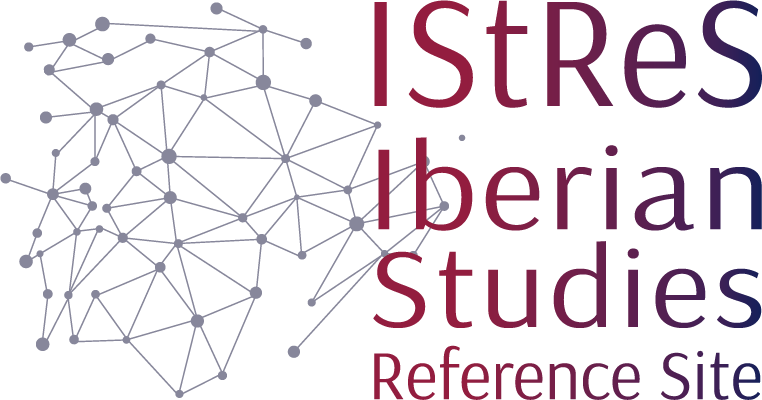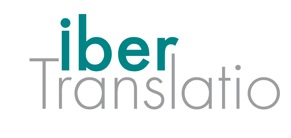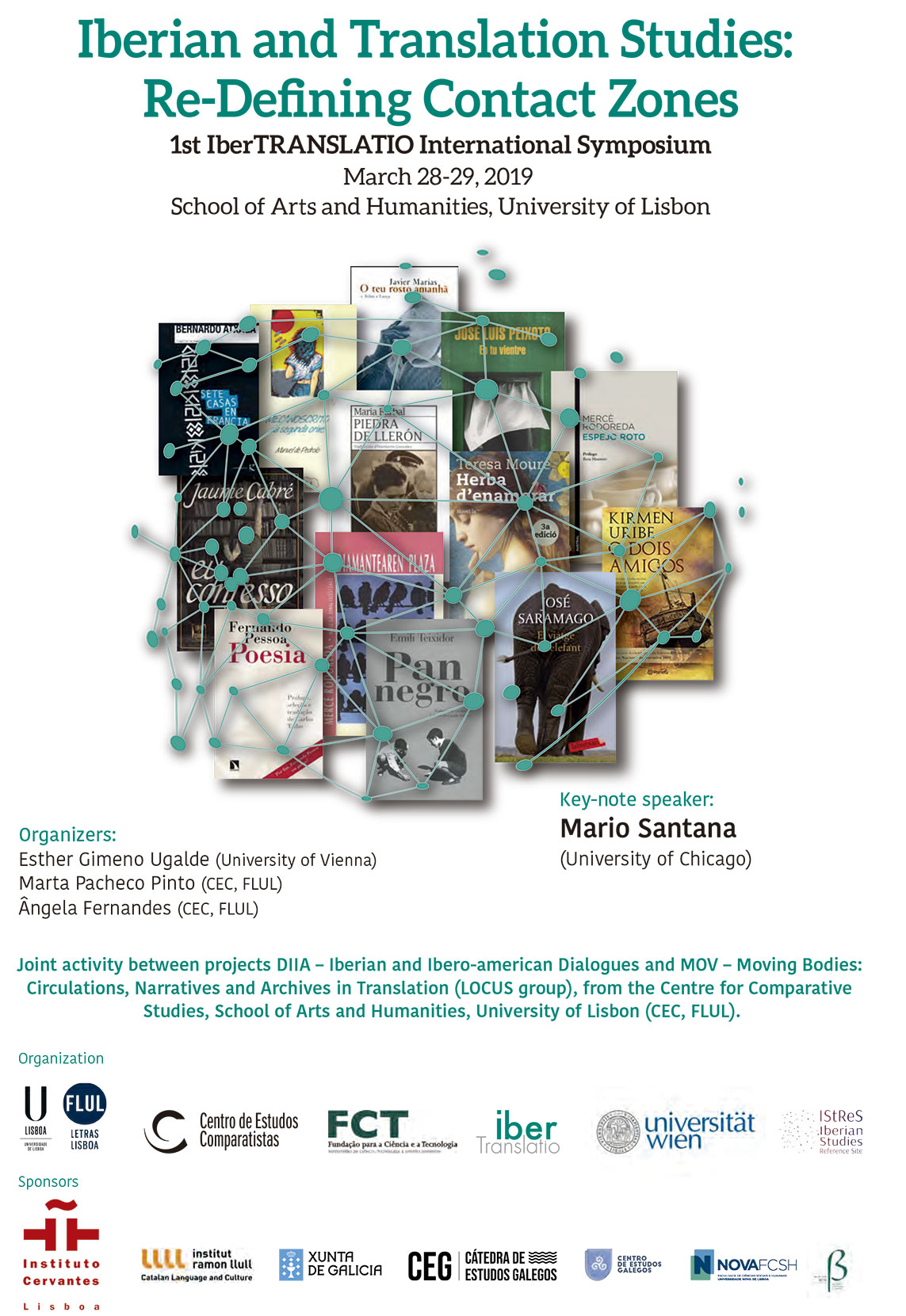Research fields/interests
- Iberian Studies
- Visual Culture (Hispanic, Lusophone and Catalan Cinema)
- Aesthetics of Multilingualism in Film and Literature
- Interliterary and Cultural Relations in Contemporary Iberia
- Translation Studies and Translation Theory
- Self-Translation
- Transfiction
Projects
IStReS (Iberian Studies Reference Site)

In spite of the fact that the discipline of Iberian Studies has developed rapidly over the last few years, there has not yet been an effort to systematize and compile a bibliography for the field. Numerous publications from recent decades have not yet been academically and scientifically connected, which poses an obstacle to the creation of a coherent vision of the whole field, as well as to its immediate development. This new reference site aims to fill a void in the field. It is proving highly useful to the meta-study of Iberian Studies, as it allows scholars to identify the most studied historical periods, the polycentric relationships that have aroused the most academic interest so far, the most frequently used and studied languages in the field, and the academic centers that support and promote it. The gathered information, in turn, will help the academic community reconsider the field, define its theoretical and methodological corpus going forward, and determine which areas, geo-spaces, and periods require greater attention.
IStReS is a database that collects and systematizes the academic work that has been done in the emerging field of Iberian Studies over the two decades since its establishment as an inter-disciplinary and institutional field. The database gathers a complete and relational bibliography of publications produced in multiple languages, including every Iberian language, that concern the polycentric relationships between the different cultures and literatures of the Peninsula throughout history. It also includes a “Who’s who” section, destined to highlight the most relevant scholars in Iberian Studies and their contribution to the field, and a “News” section providing up-to-date information related to Iberian Studies, such as conferences, symposia, calls for papers, publications, etc.
Partially funded by the Foundation for Science and Technology’s “Digital Map of Iberian Literary Relations (1870-1930)” [IF/00838/2014] Exploratory Project, by the Center for Comparative Studies (Faculty of Arts and Humanities of the University of Lisbon), and Boston College’s Morrissey College of Arts & Sciences, the interdisciplinary combination of Iberian Studies and Digital Humanities is one of the innovative aspects of this project.
IberTRANSLATIO – Iberian Studies and Translation Spaces

As a complex cultural phenomenon, the study of translation should encompass all of its dimensions, addressing the political, historical, social, economic, editorial and literary context in which the act of translating is carried out. The Iberian space’s cultural and linguistic complexity and diversity make it an ideal place to study translation’s role as a mediator between literatures and cultures and to analyse the evolving dynamics of power and resistance revealed by the distinct relationships that translation establishes (Castro et al. 2017). Grounded in the cultural lens of Translation Studies (Bassnett and Lefevre 1990), and in the polycentric principals of Iberian Studies, this new line of research within the DIIA cluster (Diálogos Ibéricos e Iberoamericanos) proposes to study the phenomenon of translation across different eras, angles, aspects in order to analyse its central role in the (re)configuration of the field of Iberian Studies.
IberTRANSLATIO has two main objectives: firstly, to study the role of translation as a mediator between the diverse literatures and cultures of the Iberian Peninsula, and secondly, to evaluate and rethink the role of translation in the discipline of Iberian Studies going forward. With these dual aims, this research project opens doors for the study of multiple areas and complex phenomena within the Iberian space.
Research Team (2018-2020)
Researchers
Esther Gimeno Ugalde (University of Vienna, Department of Romance Studies) – Coordinator
Isabel Araújo Branco (Universidade Nova de Lisboa, Centro de Humanidades)
Miguel Mochila (Universidade de Lisboa, Centro de Estudios Comparatistas)
Antonio Sáez Delgado (Universidade de Évora and UL, CEC)
Robert Newcomb (University of California Davis, Department of Spanish and Portuguese)
Collaborators
Angela Fernandes (Universidade de Lisboa, CEC)
Santiago Pérez-Isasi (Universidade de Lisboa, CEC)
Cristina Almeida Ribeiro (UL, CEC)
Inês Espada Vieira (Universidade Católica Portuguesa)
Marta Pacheco Pinto (Universidade de Lisboa, CEC)
(In)visible languages in Iberian literatures: Power Relations and Cultures of Translation
The question of (in)visibility is key in cross-cultural processes like literary translation, particularly in literary systems with enormous disparities, as is the case in the Iberian Peninsula. Through the analysis of a selected corpus of novels—originally written in Basque, Catalan, and Galician—that have circulated by means of translation within the Iberian geocultural space, this project analyzes how and to what extent difference resists, becomes veiled, or is wiped out in the era of globalization. At the core of this research is the question of whether particularity is translated differently depending on the location—in a broad sense—and the symbolic capital of the designated literatures. Aligned with the Iberian Studies’ polycentric approach, this study specifically directs attention to (1) the relationship between these three ‘minoritized’ literatures, as well as (2) their relationship to the Peninsula’s global literatures (Portuguese and Peninsular Spanish). The combination of quantitative (translation flows) and qualitative (original and translated novels) methods will serve (1) to examine cultural relationships and power dynamics (peripheral-central and trans-peripheral) in 21st-century Iberia; (2) to showcase echoes, traces and erasures of linguistic and cultural otherness in translated literature; and (3) to determine whether location and symbolic capital may vary the way in which cultural and linguistic difference is being translated. At the intersection between Iberian Studies and Translation Studies, this research will contribute to a deeper understanding of European cultural diversity and of literary translation’s key role in promoting—or hindering—its richness.
Symposia and events
1st IberTRANSLATIO International Symposium
Iberian and Translation Studies: Re-Defining Contact Zones
March 28-29, 2019
School of Arts and Humanities, University of Lisbon
The complete program can be viewed here.

Panel “Cinema de migração: Espaço, movimento e travessia de fronteiras no filme lusófono”
September 11-14, 2019
13th Lusophone Symposium, University of Augsburg